On the factor of the case when playing "Monopoly"
The Everyday Tools team, like many others, likes to play good old boards from time to time on Fridays. For some, there are even conspiracy names. Here, for example, content managers sit and say to each other: “And if we don’t have to practice the skills of keyword selection?”, The piglets, the game “Captain Obviousness”, get it.

Today we want to touch the imperishable classics. "Monopoly" or "Manager", coming into our life in childhood, remains in it for a long time. There are a number of reasons for this, but of course we will not discuss them here. Let's better imagine that you and the team, in our image and likeness, decided to pass the last, longest, Friday work hour while playing “Monopoly”. Sixty minutes is the maximum that, according to professionals, should go to the game, but in fact for some reason it usually goes out differently and three hours later some two-three players still throw dice with an unhealthy gleam in their eyes.
')
Why is that? It turns out because most people do not play according to the schemes that are designed for the quick and effective destruction of the enemy. These deadly schemes will be discussed in today's material.
In general, the above we tend to the fact that the game has existed for a long time and has always awakened in people unhealthy enthusiasm and willingness to do anything to win. It would be strange if all the possible moves, scenarios and rules had not yet been sorted out by bone, in order to calculate the optimal strategy. With this in mind, a group of our employees (who are tired of losing) set off on an expedition across the expanses of the Russian and English-speaking Internet in the hope of finding some popular wisdom in this regard.
The result exceeded expectations. First, there are a great many articles, schemes and manuals, both very ancient and relatively fresh. Secondly, along with straightforward advice in the spirit of “try not to bring it to the stabbing”, there are also instances that look like something straight from the magazine “Terver for the whole family.”
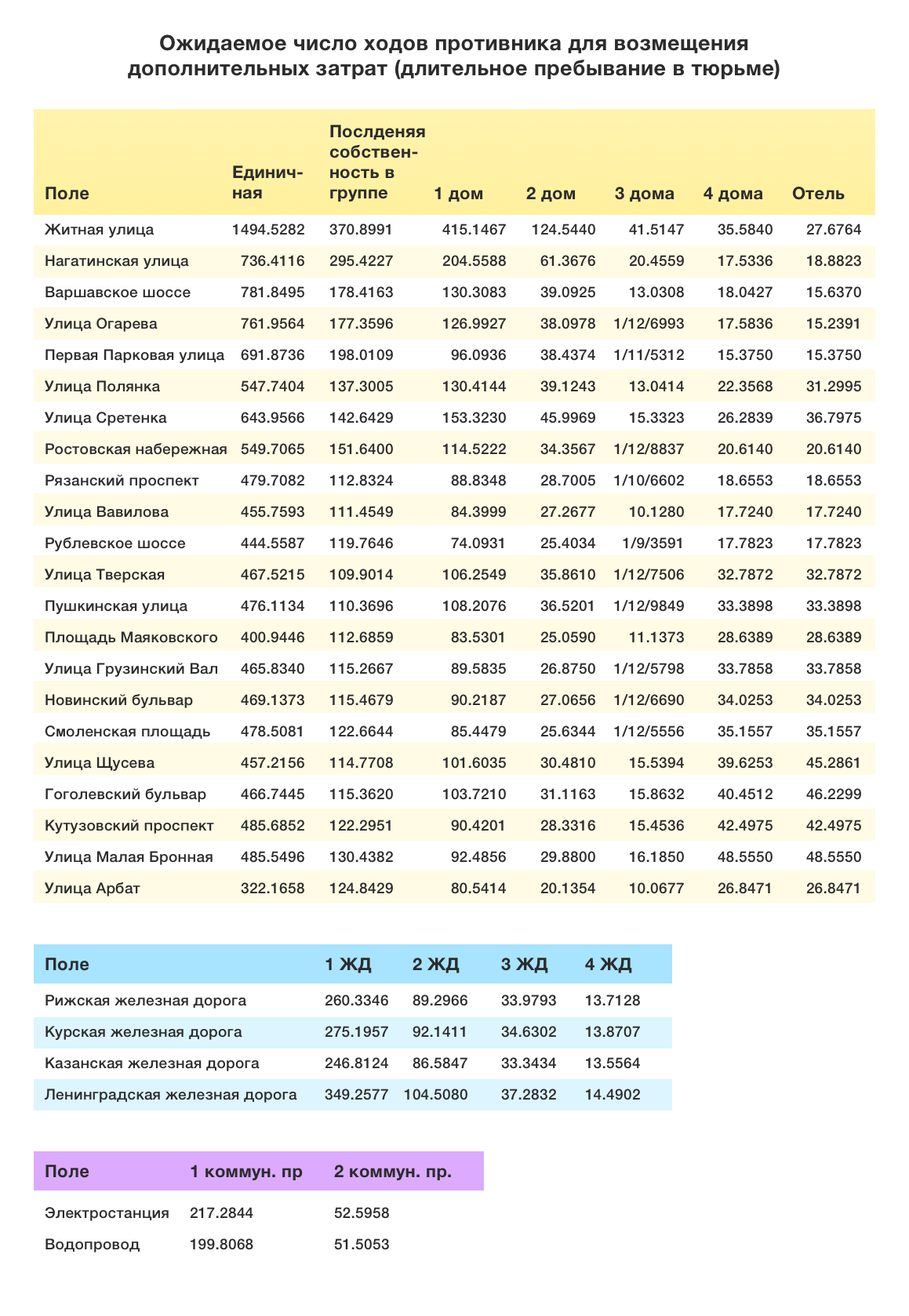
Image source: moneypoly.ru/monopoly/probabilities.htm
Having a little recovered, we made a sample of recommendations that are supported by the majority of studied sources and carefully tried to correlate them with what these mathematical tables say. As it turned out, there is no complete agreement on some issues in the Internet community - we mentally noted such controversial points to check during the game. As a result of many hours of work, such a training manual for a beginning capitalist turned out.
Ten out of ten Monopoly players are sure that they know the rules, and nine out of ten Monopoly players are deeply mistaken. The rules there are a whole booklet in a small font, and, although most of the people gathered around the playing field usually have a general idea of the mechanics of the game, this is often the case. Particulars fall out of memory and many intentionally introduced difficulties and opportunities are wasted in vain simply by an oversight.
The most annoying thing is that not some nonsense, but very valuable things get into oblivion. For example, one of the rules that is often ignored is placing auctioned orphaned property for auction if the player whose chip hit the appropriate field refuses to purchase it. Needless to say, if you stick to it, the pace of the game will immediately increase, the situation will heat up - and we are exactly after all trying to achieve this.
Another example is a limited number of homes. Sometimes he is mistaken for a lack of equipment and “corrects” the situation: he is compensated by his own crafts, or arbitrary quotas are set. In fact, everything is correct, and there should be a shortage of homes for all - is there a monopoly here or what? This circumstance can and should be turned in its favor.
In general, do not be lazy to refresh the rules of the game - the knowledge of the laws here, as in real life, is fully paid off. And keep the booklet on hand, so that there is something to show if your expertise is questioned.
By the way, excitement is excitement, but attentiveness and memory are generally useful qualities in Monopoly. It would be nice, for example, to remember the approximate order of the cards; then, when they go to the second round, you can roughly predict what surprises to expect in the near future.
The game of "Monopoly" is characterized by an uneven pace. Any party splits into two parts: 1) race ahead of the curve and 2) starve. In the course of the first, monopolies are formed, in the course of the second, the newly baked bourgeois pull the veins from their less fortunate comrades until those run out of resources. It is your actions at the beginning of the game that will determine its further course, so be on a low start from the very beginning of the game.
What do we mean by low start? First, you, at a minimum, need to be in the game all the time - in the initial stages you cannot afford the luxury of trying to sit yourself in a double in prison for reasons of economy. Save this pleasure for later: when monopolies are formed, it will be profitable to skip moves, on the contrary - the less you wander around someone else's property, the less you pay.
Secondly, the first circles - the time for action. Use the fact that the field of opportunities is not limited yet and try to make the most promising deals as quickly as possible, even if you have to lose money somewhere. In general, all experts agree that the best strategy for the starting stage is to buy everything that is not pinned. But you still have a limited amount of money, so let's figure out what to give preference to.
At the heart of any worthwhile strategy are two basic principles that we all know from noughts and crosses:
Let's make a reservation that this division into main and side, strictly speaking, works only for the first monopoly, then everything becomes more complicated. Someone recommends that you immediately throw all the forces on the next, someone thinks that it is better to take a break and start building. Probably there is no universal answer, it all depends on the specific situation: what streets you have already bought, how much free money and plots remain, what is the balance of power among the other players.
Otherwise, everything is seemingly transparent. But the next step is to determine the color, and this is a much more interesting question.
As everyone probably remembers, the color groups in “Monopoly” are not the same: they differ both in their location on the field, in the number of streets, in their cost, and in rental rates. And each of these parameters affects how much you gain from your monopoly in the long run.
Suppose, what color groups to take, cheaper or more expensive? Here we must take into account that those areas that promise to pay off well, and cost on long distances (with houses and all the rest) will be quite a lot. As a result, there is a real danger at some point simply to “get stuck” due to lack of money, while your opponents settle their plots on the cheap. So think twice before aiming at the most elite groups.
Further: groups of two elements look seductive, but, of course, there was a trick here - they are located on the side of the field, where players get less often, and therefore they bring less rent. Accordingly, blue and purple streets are not a priority choice either.
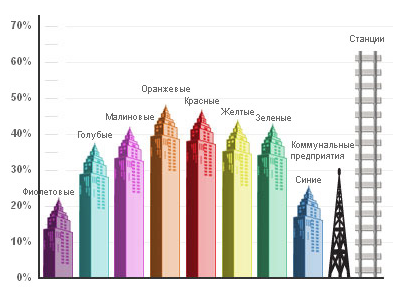
Image source: monopoly-game.ru
All this is very interesting, you say, but somehow vague and unproven. Well, let's turn to the numbers. We recognize right away: we did not find a complete summary table with calculations for all parameters on the web. Probably, this is even for the better, otherwise the game would have reached such a degree of predictability that it would simply lose its meaning. But statistics on individual factors worked out so carefully that it is even scary.
For example, here are the calculations from Monepoly, which represent in the format of a temperature map the total volume of investments and the number of steps for which the costs of each group on average are paid off.
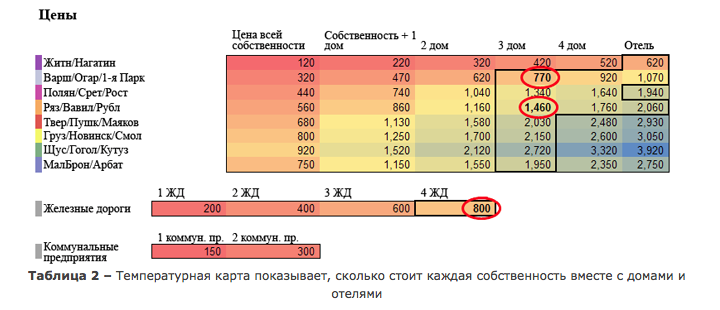

Image source: www.amnesta.net/monopoly
As we see, in terms of the exact sciences, the best payback options are orange and blue color groups, as well as railway stations.
But do not be in a hurry: all these calculations were made quite arbitrarily, based on the accepted assumption that the game will unfold according to a certain averaged pattern. You can dig and deeper! Other material on Moneypoly provides detailed statistics on the probability of hitting the chips on each playing field:

Image source: moneypoly.ru/monopoly/probabilities.htm
And then, based on this, the yield per turn is calculated for several different game scenarios. By the way, the person who did all this, claims that he is not particularly keen on the "Monopoly":

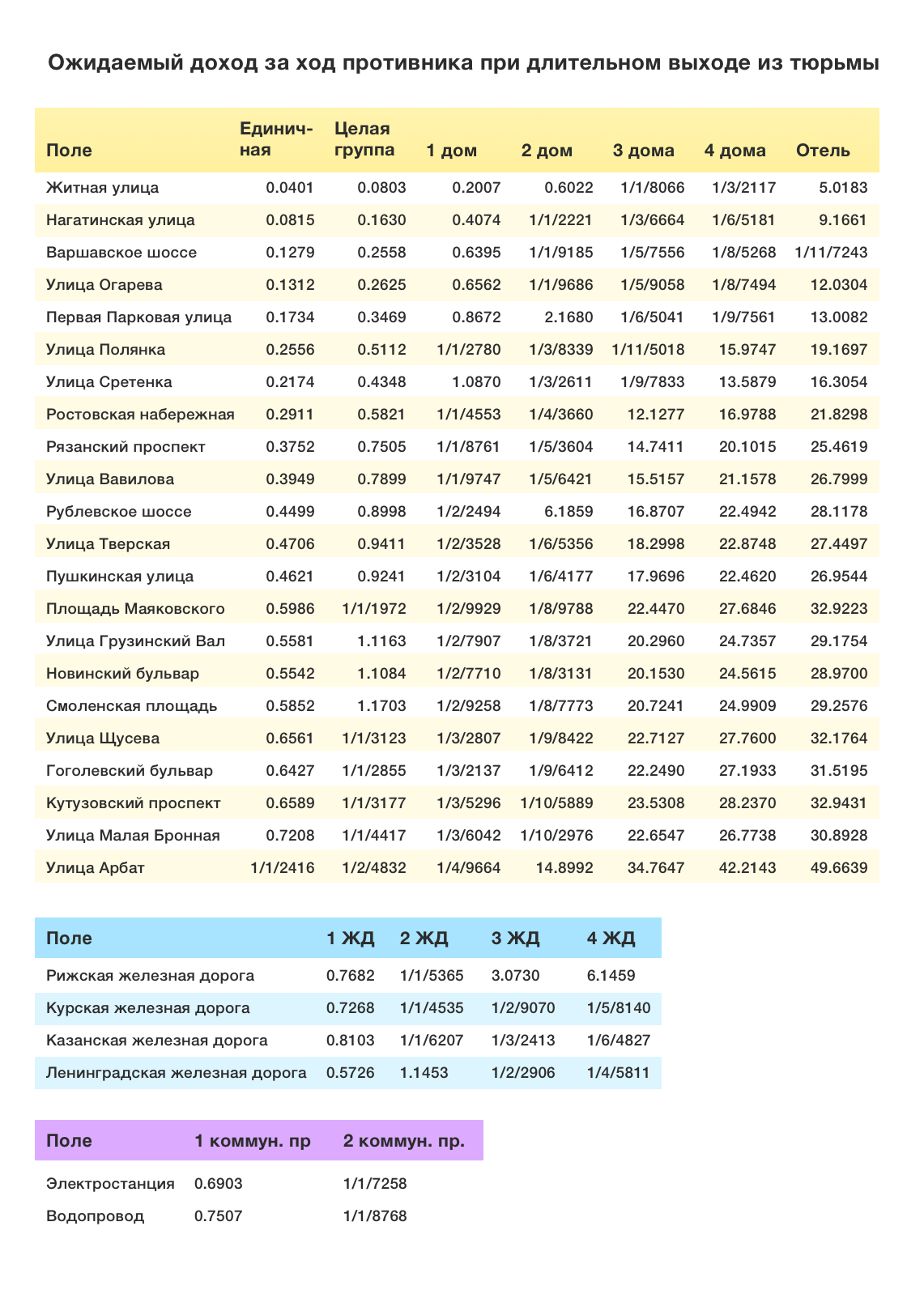
Image source: moneypoly.ru/monopoly/probabilities.htm
In general, the conclusions made by the author on the basis of this extremely detailed statistics do not contradict those that migrate from article to article without detailed calculations. So, the general verdict:
Well, since we are talking about houses ...
It's funny that on development issues we occasionally came across life hacks who, in fact, are one-on-one repeating the rules. For example, in several sources, experts advised to build up the plots evenly, adding new houses to each in turn, although otherwise, in theory, it is impossible. Therefore, we repeat: study the manual before the game starts.
Anyway, the experts decided: you need to build houses, and as quickly as possible, and preferably (see above) in the amount of three pieces. Individual voices recommended one or two, but mathematically calculations do not support this strategy.
On the other hand, if the money allows, you can build up the plots of houses and to the limit. The point here is not so much in achieving the optimal ratio of costs and rental income, but rather in maximizing the possibility of rivals to improve their property. The grin of capitalism as it is.
Accordingly, from the construction of hotels, on the contrary, it is better to refrain - because then you have to hand over to the treasury all the houses to the joy of the other players. You are not here to please anyone!
Need to say a few words about mortgages. Some suggest using them as a component of the development strategy: lay one bank to a bank and quietly develop all the rest to the proceeds - in principle, the rules do not prohibit such and even protect your monopoly from those who want to outbid the mortgaged. But, given that the mortgage is admissible only in a situation of partial bankruptcy (there is no money at all, but the property is not yet sold out), we still would not be advised to risk to such an extent.
Deal with the plots, but what about state property? The communal enterprises of the Internet issued a unanimous harsh verdict: because of the low attendance of profits, they bring in an hour for a teaspoon and contact them is not worth it. As for stations, where, as we have seen, players land much more often, everything is less and less unequivocal. On the one hand, their uncommon average payback period attracts many. But at the same time:
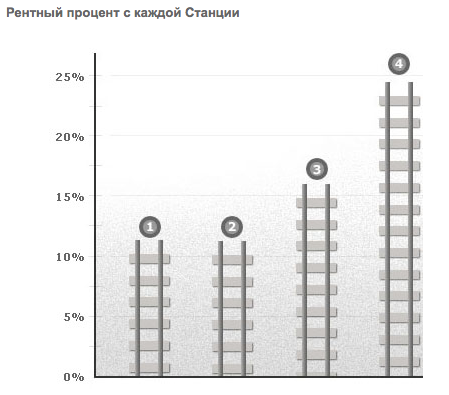
Image source: monopoly-game.ru/guide/breakdown/pay-back/railroads.html
From the graph it is obvious that the value of this type of property jumps and reaches significant values only after the purchase of the last, fourth station.
Accordingly, you can act in three ways:
Each approach has its supporters. Personally, the third point seems to be the most rational for us - the wolves are fed and the sheep are safe. In addition, it is good to have one station in reserve for bidding: thanks to their reputation as profitable, they are well valued and are readily accepted as payment.
One of the main pleasures in “Monopoly” is thick bundles of bills with a bunch of zeros, which you are given for nothing. But here lies the catch: in fact, you should have as little cash as possible at any stage of the game. It is logical: if the money is in your hands, it means that they are not “in action” and, accordingly, a bad monopolist among you. On the other hand, it is also impossible to remain completely penniless - and the habit is bad, and property can be lost.
How much money do you need to have on hand always for unexpected expenses? Sources call numbers from 300 to $ 600. We venture to suggest that at the beginning of the game it is better to focus on the lower limit (all the fields have not been bought yet, and therefore you will have to pay less often), and then you can dig a little just in case. Especially with proper investment, over time you will be more and more “in the black”.
Two words about debt. “Monopoly” is probably the only time when it is beneficial to be accommodating and generous. Agree to the calculation of "in-kind" even to the detriment - currency, and the fact that the enemy will lose property or part of the buildings will be transferred to your fund is priceless. It only makes sense to demand a purely monetary compensation in those cases if you have a critical financial situation yourself and offer something not particularly valuable as an alternative.
***
So, the secret code from "Monopoly" was in our hands! Armed with strategic calculations and mathematical evidence, the control group entered the warpath. And, naturally (you waited for this), all broke up. Here’s how it was:
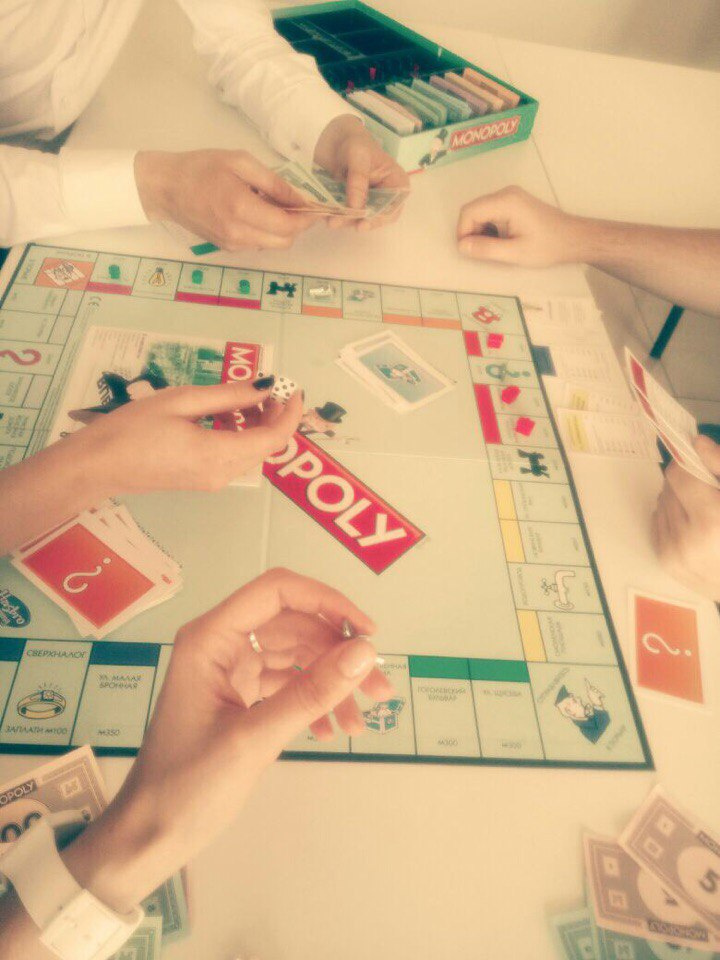

Today we want to touch the imperishable classics. "Monopoly" or "Manager", coming into our life in childhood, remains in it for a long time. There are a number of reasons for this, but of course we will not discuss them here. Let's better imagine that you and the team, in our image and likeness, decided to pass the last, longest, Friday work hour while playing “Monopoly”. Sixty minutes is the maximum that, according to professionals, should go to the game, but in fact for some reason it usually goes out differently and three hours later some two-three players still throw dice with an unhealthy gleam in their eyes.
')
Why is that? It turns out because most people do not play according to the schemes that are designed for the quick and effective destruction of the enemy. These deadly schemes will be discussed in today's material.
Historical background that everyone will miss
The official date when the game "Monopoly" was published, is considered February 6, 1935. However, if you dig deeper, its story begins at the dawn of the 20th century, when “The Landlord's Game” appeared on the market, a game by Elizabeth Maggie with very similar rules. In fact, it was created with an instructive purpose to show the children on an intelligible example how destructive and fundamentally unfair the capitalist market model is, but from the very beginning something went wrong. Not only children, but also adults quickly became involved in the role of capitalist sharks and began to drown each other with great enthusiasm. In the light of the emerging popularity in the following decades, copyright revolted around copyright, worthy of a game about the horrors of capitalism. The winner in it came a certain Charles Darrow, who called his product a well-known name.
By the way, in the pilot version of Maggie, there were two possible game models: capitalist, with the goal of building a monopoly, and anti-capitalist, with the goal of providing profit to all players. The first of them formed the basis of the modern version, while the second did not take root and quickly went into non-existence - take note, if you still have any illusions about human nature.
By the way, in the pilot version of Maggie, there were two possible game models: capitalist, with the goal of building a monopoly, and anti-capitalist, with the goal of providing profit to all players. The first of them formed the basis of the modern version, while the second did not take root and quickly went into non-existence - take note, if you still have any illusions about human nature.
In general, the above we tend to the fact that the game has existed for a long time and has always awakened in people unhealthy enthusiasm and willingness to do anything to win. It would be strange if all the possible moves, scenarios and rules had not yet been sorted out by bone, in order to calculate the optimal strategy. With this in mind, a group of our employees (who are tired of losing) set off on an expedition across the expanses of the Russian and English-speaking Internet in the hope of finding some popular wisdom in this regard.
The result exceeded expectations. First, there are a great many articles, schemes and manuals, both very ancient and relatively fresh. Secondly, along with straightforward advice in the spirit of “try not to bring it to the stabbing”, there are also instances that look like something straight from the magazine “Terver for the whole family.”

Image source: moneypoly.ru/monopoly/probabilities.htm
Having a little recovered, we made a sample of recommendations that are supported by the majority of studied sources and carefully tried to correlate them with what these mathematical tables say. As it turned out, there is no complete agreement on some issues in the Internet community - we mentally noted such controversial points to check during the game. As a result of many hours of work, such a training manual for a beginning capitalist turned out.
Ignorance of the law is not an excuse
Ten out of ten Monopoly players are sure that they know the rules, and nine out of ten Monopoly players are deeply mistaken. The rules there are a whole booklet in a small font, and, although most of the people gathered around the playing field usually have a general idea of the mechanics of the game, this is often the case. Particulars fall out of memory and many intentionally introduced difficulties and opportunities are wasted in vain simply by an oversight.
The most annoying thing is that not some nonsense, but very valuable things get into oblivion. For example, one of the rules that is often ignored is placing auctioned orphaned property for auction if the player whose chip hit the appropriate field refuses to purchase it. Needless to say, if you stick to it, the pace of the game will immediately increase, the situation will heat up - and we are exactly after all trying to achieve this.
Another example is a limited number of homes. Sometimes he is mistaken for a lack of equipment and “corrects” the situation: he is compensated by his own crafts, or arbitrary quotas are set. In fact, everything is correct, and there should be a shortage of homes for all - is there a monopoly here or what? This circumstance can and should be turned in its favor.
In general, do not be lazy to refresh the rules of the game - the knowledge of the laws here, as in real life, is fully paid off. And keep the booklet on hand, so that there is something to show if your expertise is questioned.
By the way, excitement is excitement, but attentiveness and memory are generally useful qualities in Monopoly. It would be nice, for example, to remember the approximate order of the cards; then, when they go to the second round, you can roughly predict what surprises to expect in the near future.
Hush go - next finish
The game of "Monopoly" is characterized by an uneven pace. Any party splits into two parts: 1) race ahead of the curve and 2) starve. In the course of the first, monopolies are formed, in the course of the second, the newly baked bourgeois pull the veins from their less fortunate comrades until those run out of resources. It is your actions at the beginning of the game that will determine its further course, so be on a low start from the very beginning of the game.
What do we mean by low start? First, you, at a minimum, need to be in the game all the time - in the initial stages you cannot afford the luxury of trying to sit yourself in a double in prison for reasons of economy. Save this pleasure for later: when monopolies are formed, it will be profitable to skip moves, on the contrary - the less you wander around someone else's property, the less you pay.
Secondly, the first circles - the time for action. Use the fact that the field of opportunities is not limited yet and try to make the most promising deals as quickly as possible, even if you have to lose money somewhere. In general, all experts agree that the best strategy for the starting stage is to buy everything that is not pinned. But you still have a limited amount of money, so let's figure out what to give preference to.
At the heart of any worthwhile strategy are two basic principles that we all know from noughts and crosses:
- Your main goal is to establish a monopoly, so purposefully buy the property of one of your chosen colors.
- Your side goal is to prevent opponents from doing the same, so outbid the real estate of “alien” colors if you notice that someone has a full set
Let's make a reservation that this division into main and side, strictly speaking, works only for the first monopoly, then everything becomes more complicated. Someone recommends that you immediately throw all the forces on the next, someone thinks that it is better to take a break and start building. Probably there is no universal answer, it all depends on the specific situation: what streets you have already bought, how much free money and plots remain, what is the balance of power among the other players.
Otherwise, everything is seemingly transparent. But the next step is to determine the color, and this is a much more interesting question.
Districts, neighborhoods ...
As everyone probably remembers, the color groups in “Monopoly” are not the same: they differ both in their location on the field, in the number of streets, in their cost, and in rental rates. And each of these parameters affects how much you gain from your monopoly in the long run.
Suppose, what color groups to take, cheaper or more expensive? Here we must take into account that those areas that promise to pay off well, and cost on long distances (with houses and all the rest) will be quite a lot. As a result, there is a real danger at some point simply to “get stuck” due to lack of money, while your opponents settle their plots on the cheap. So think twice before aiming at the most elite groups.
Further: groups of two elements look seductive, but, of course, there was a trick here - they are located on the side of the field, where players get less often, and therefore they bring less rent. Accordingly, blue and purple streets are not a priority choice either.

Image source: monopoly-game.ru
All this is very interesting, you say, but somehow vague and unproven. Well, let's turn to the numbers. We recognize right away: we did not find a complete summary table with calculations for all parameters on the web. Probably, this is even for the better, otherwise the game would have reached such a degree of predictability that it would simply lose its meaning. But statistics on individual factors worked out so carefully that it is even scary.
For example, here are the calculations from Monepoly, which represent in the format of a temperature map the total volume of investments and the number of steps for which the costs of each group on average are paid off.


Image source: www.amnesta.net/monopoly
As we see, in terms of the exact sciences, the best payback options are orange and blue color groups, as well as railway stations.
But do not be in a hurry: all these calculations were made quite arbitrarily, based on the accepted assumption that the game will unfold according to a certain averaged pattern. You can dig and deeper! Other material on Moneypoly provides detailed statistics on the probability of hitting the chips on each playing field:

Image source: moneypoly.ru/monopoly/probabilities.htm
And then, based on this, the yield per turn is calculated for several different game scenarios. By the way, the person who did all this, claims that he is not particularly keen on the "Monopoly":


Image source: moneypoly.ru/monopoly/probabilities.htm
In general, the conclusions made by the author on the basis of this extremely detailed statistics do not contradict those that migrate from article to article without detailed calculations. So, the general verdict:
- Railways lead in cost-earnings ratio
- Orange field - the best option for building
- The purple sector loses to the rest, especially while the monopoly has not yet been reached.
- Peak profitability for the most part falls on the third house
Well, since we are talking about houses ...
Building a dream house (or three)
It's funny that on development issues we occasionally came across life hacks who, in fact, are one-on-one repeating the rules. For example, in several sources, experts advised to build up the plots evenly, adding new houses to each in turn, although otherwise, in theory, it is impossible. Therefore, we repeat: study the manual before the game starts.
Anyway, the experts decided: you need to build houses, and as quickly as possible, and preferably (see above) in the amount of three pieces. Individual voices recommended one or two, but mathematically calculations do not support this strategy.
On the other hand, if the money allows, you can build up the plots of houses and to the limit. The point here is not so much in achieving the optimal ratio of costs and rental income, but rather in maximizing the possibility of rivals to improve their property. The grin of capitalism as it is.
Accordingly, from the construction of hotels, on the contrary, it is better to refrain - because then you have to hand over to the treasury all the houses to the joy of the other players. You are not here to please anyone!
Need to say a few words about mortgages. Some suggest using them as a component of the development strategy: lay one bank to a bank and quietly develop all the rest to the proceeds - in principle, the rules do not prohibit such and even protect your monopoly from those who want to outbid the mortgaged. But, given that the mortgage is admissible only in a situation of partial bankruptcy (there is no money at all, but the property is not yet sold out), we still would not be advised to risk to such an extent.
Gos.sektor and you
Deal with the plots, but what about state property? The communal enterprises of the Internet issued a unanimous harsh verdict: because of the low attendance of profits, they bring in an hour for a teaspoon and contact them is not worth it. As for stations, where, as we have seen, players land much more often, everything is less and less unequivocal. On the one hand, their uncommon average payback period attracts many. But at the same time:

Image source: monopoly-game.ru/guide/breakdown/pay-back/railroads.html
From the graph it is obvious that the value of this type of property jumps and reaches significant values only after the purchase of the last, fourth station.
Accordingly, you can act in three ways:
- Generally give up at the stations and focus attention and resources on the sites
- Try to establish a monopoly to ensure the flow of funds
- Do not spend money unnecessarily, but keep your eyes open, not allowing a monopoly to be built by someone else.
Each approach has its supporters. Personally, the third point seems to be the most rational for us - the wolves are fed and the sheep are safe. In addition, it is good to have one station in reserve for bidding: thanks to their reputation as profitable, they are well valued and are readily accepted as payment.
Saving
One of the main pleasures in “Monopoly” is thick bundles of bills with a bunch of zeros, which you are given for nothing. But here lies the catch: in fact, you should have as little cash as possible at any stage of the game. It is logical: if the money is in your hands, it means that they are not “in action” and, accordingly, a bad monopolist among you. On the other hand, it is also impossible to remain completely penniless - and the habit is bad, and property can be lost.
How much money do you need to have on hand always for unexpected expenses? Sources call numbers from 300 to $ 600. We venture to suggest that at the beginning of the game it is better to focus on the lower limit (all the fields have not been bought yet, and therefore you will have to pay less often), and then you can dig a little just in case. Especially with proper investment, over time you will be more and more “in the black”.
Two words about debt. “Monopoly” is probably the only time when it is beneficial to be accommodating and generous. Agree to the calculation of "in-kind" even to the detriment - currency, and the fact that the enemy will lose property or part of the buildings will be transferred to your fund is priceless. It only makes sense to demand a purely monetary compensation in those cases if you have a critical financial situation yourself and offer something not particularly valuable as an alternative.
***
So, the secret code from "Monopoly" was in our hands! Armed with strategic calculations and mathematical evidence, the control group entered the warpath. And, naturally (you waited for this), all broke up. Here’s how it was:

Source: https://habr.com/ru/post/337972/
All Articles